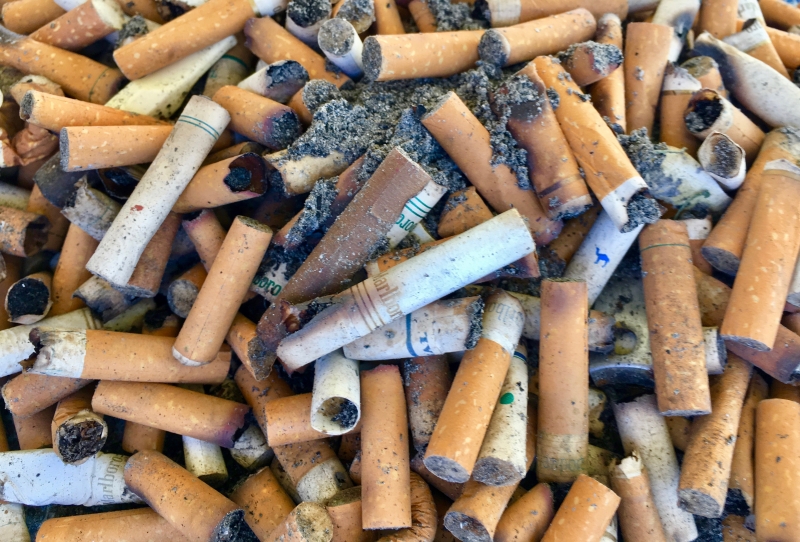Cigarette butts are the most common type of debris found during cleanups. Consistently, for over 25 years, cigarettes butts have been the top item collected during the International Coastal Cleanup (ICC). In 2017 alone, more than 2.4 million cigarette butts were found at cleanup sites during the ICC. Although the amount of cigarettes consumed in the US is steadily falling, the amount of cigarette butts found in our ocean and Great Lakes is not. Why do these butts persist in our waters? And why are they such a problem, aren’t they made of natural materials?
Most people tend to assume cigarette filters are made of natural fibers, like cotton, that will easily break down in the natural environment. When cigarette filters first became popular in the 1960s, tobacco companies found that natural fibers could not keep up with demand. Instead, filters are made out of cellulose acetate, a plastic-like material that’s easy to manufacture, but not easy to degrade. The fibers in cigarette filters behave just like plastics in our oceans, the UV rays from our sun may break the fibers down into smaller pieces, but they don’t disappear. They persist in water, on beaches, and in urban environments. In 2012 alone, Americans consumed over 300 billion cigarettes and many people still believe that butts are an acceptable form of litter. All those cigarette butts from all those cigarettes smoked can translate to tons of marine debris if not disposed of properly.
If you smoke, there are some ways to make sure that your butts stay out of the ocean and Great Lakes:
-
After you put out your cigarette, make sure the butt ends up in a proper place, like a designated cigarette butt receptacle
-
If there are no receptacles around, “field dress” your cigarettes. For decades, soldiers have been taught to unwrap their butts, dump out the extra ash and tobacco, and stick the filters in their pockets. You don’t have to be in the military to get into the habit of keeping your filters off the ground.
-
Worried about the smell from cigarettes in your pocket? Purchase a pocket ashtray! These trays can come in the form of metal boxes or vinyl pouches, fit in your pocket, purse, or backpack, and extinguish cigarettes until they can be properly disposed of in the trash.
-
Recycle your butts! Although it is not common, there are a few places, like the City of Vancouver, and organizations, like TerraCycle, that will actually recycle your filters for you. Check to see if there any programs in your area.
Whatever you do, just make sure you aren’t leaving your butts on the ground, throwing them out your car window, or or otherwise littering them. Join us at the ICC this weekend and see how many cigarette butts you find. Although they are small, their impact is huge.


Nice meeting with the people from Taroudanthy in Morocco.